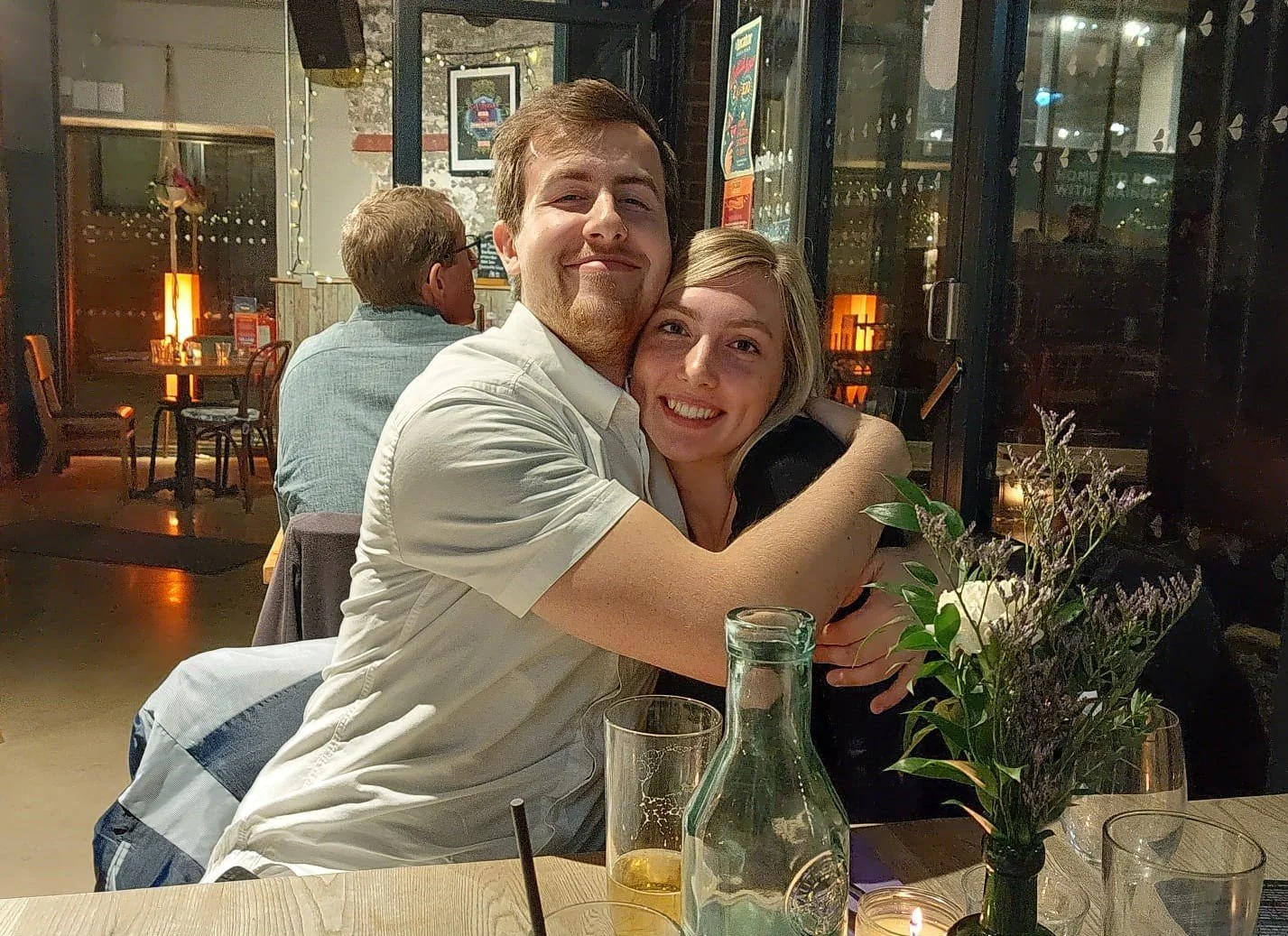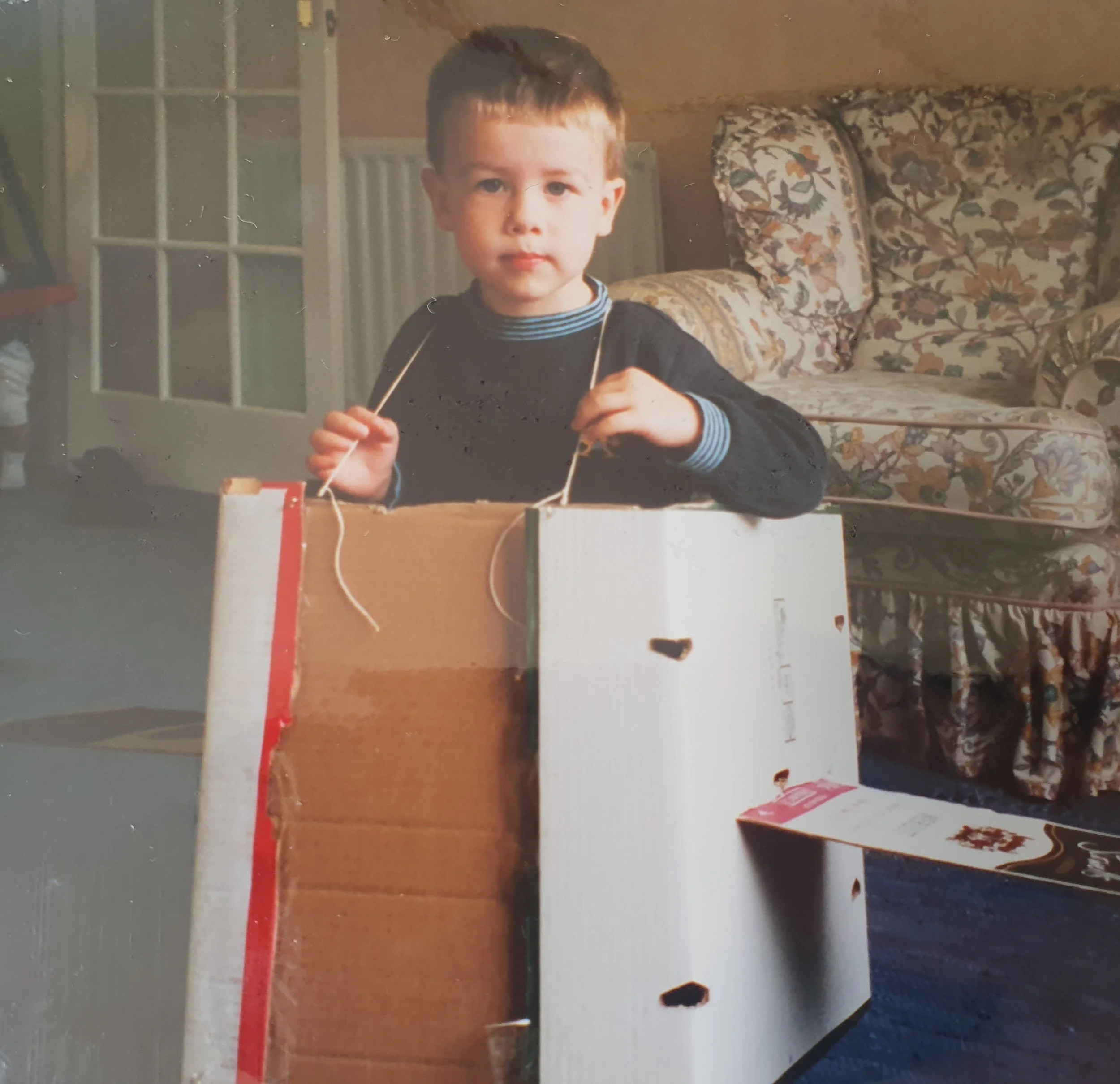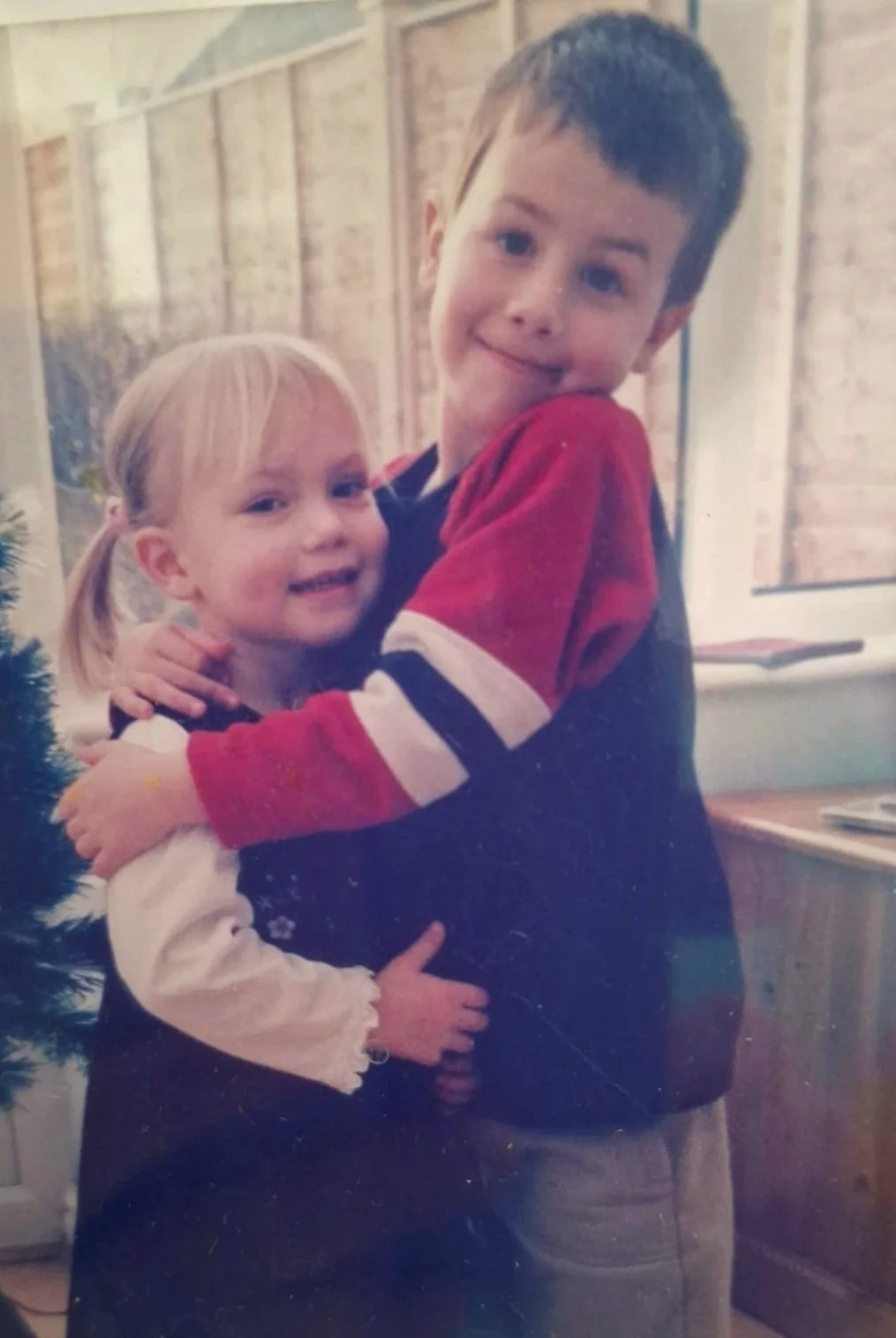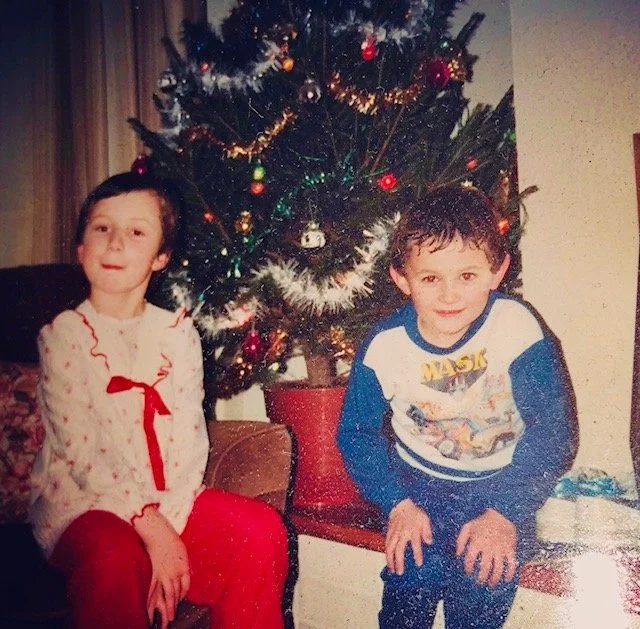Eleanor’s story
Eleanor shares her story about the death of her older brother Cameron, and the emotional weight of surviving a sibling who died by suicide.
My older brother, Cameron, died by suicide in 2024 when he was 25 and I was 23.
Cameron had been struggling with his mental health since secondary school. Although he’d occasionally tried speaking to us about how he felt in his early twenties, he either couldn’t fully tell us or we just didn’t understand then the severity of what he was facing. I think because Cameron was such a big character and he always managed to make everyone laugh, I initially struggled to comprehend how someone who seemed so passionate and enthusiastic about life could feel so sad and hopeless underneath it all.
Everything started to spiral in 2024 when Cameron’s mental health reached a crisis point. Around the summertime, I learnt Cameron had attempted to take his own life a couple of times, and then by the end of August he was sectioned into a secure mental health facility.
I was terrified of losing Cameron but tried to hold onto hope of his recovery at the hospital. We just wanted to see him as much as possible and take all his pain away, but we felt so helpless and just wondered how we’d ended up there.
In the months leading up to his death and several months after, the same questions swirled in my head, like why didn’t I see before how much he was struggling? Why didn’t I ask him how he was sooner? But also why didn’t he tell us sooner? I worried he didn’t say much to us before because he didn’t think we’d understand or listen, and I worried if I’d actually done enough for him.
I still feel guilty that maybe I didn’t go to see him enough once I learnt how much he was really struggling. I just found it so painful seeing him in his last year because I could see he was becoming just the shell of Cameron.
The visits to the hospital were hard - sitting in the little, soulless visitor room. I saw not only my brother in so much pain, but also my parents as they listened to their son trying to explain the depths of his depression and exhaustion. I’d try so hard not to cry in front of my brother and my parents because I just wanted to be strong for them in a horrible situation.
After Cameron died, I realised we were somewhat “lucky’’ because we knew he was unwell and so were able to have those difficult conversations with him, perhaps even say goodbye, before he died suddenly. But I didn’t feel able to have those more final conversations with him because I didn’t want to ‘admit defeat’ or for him to feel like we’d given up on him. But I do know Cameron felt how loved he was and I try not to dwell on what I said and how I acted because I had no idea what to do then and I’m not sure I would now either. I know we did all we could at the time and I know Cameron really had tried to get better.
I’ll always remember how awful the first month after he died was. Getting the news from my parents and rushing home to see them that evening and just hugging them so tight, not knowing what to say because it didn’t (and sometimes still doesn’t) feel real.
I felt sick to my stomach and such a raw pain in my chest.
It was almost surreal - I’d been thinking about Cameron so much that year and almost trying to prepare myself for the worst, but when the news came it was still a massive and horrifying shock. It didn’t feel real for ages and I felt very numb a lot of the time.
I felt like such a horrible sister that sometimes I didn’t feel sad about it and instead I felt nothing at all. I couldn’t figure out how I’d gone from crying non-stop, to not crying at all at the flick of a switch and I felt guilty that I wasn’t grieving ‘properly’. Really, I was just in a state of shock.
At the funeral I was definitely in auto-pilot mode because I just needed to get through that day, and then afterwards I think I was in a daze for the next few months. Although I knew the facts about what had happened, it felt like he’d just gone away and he’d be back soon so everything was okay. I’d be walking around town and I felt so strongly like I was going to see him walking around the next corner towards me. I still forget sometimes, especially when I see something I think he’ll like and I want to tell him about it, whether that’s a song, TV show or a funny post, and then I remember I can’t.
“I felt like such a horrible sister that sometimes I didn’t feel sad about it and instead I felt nothing at all. I couldn’t figure out how I’d gone from crying non-stop, to not crying at all at the flick of a switch and I felt guilty that I wasn’t grieving ‘properly’. Really, I was just in a state of shock.”
Seeing my parents so upset was heartbreaking and all I wanted was for things to go back to normal. It felt like all the colour and brightness of our lives had been turned down. Doing things we once did as a family of four felt wrong and were just a reminder of his absence, like: playing particular board games; sitting down for a Sunday Roast; or going on holiday. But as time passes I think these moments become an opportunity to remember and honour Cameron as we navigate moving forwards, but never forgetting him.
I wanted to freeze time because the months seemed to go by so fast and I felt overwhelmed thinking about approaching his 1-year anniversary. I was always thinking about what we were all doing this time last year, particularly around the summertime when everything had got so awful. Sometimes it felt as though it had only happened yesterday and it felt wrong that all this time we’d been living without him.
At times I struggled feeling guilty for being here when my brother wasn’t. Cameron was such a larger-than-life character; he was very charismatic, intelligent, funny and popular.
Growing up I always admired him for having all these amazing qualities that I didn’t think I really had, so for a while I felt like the ‘better’ sibling had died. I knew this wasn’t rational and I reminded myself that Cameron would never want me to feel that way, but the feelings were hard to shake.
Learning about “survivor’s guilt” helped me understand this was a common grief experience. I found comfort in thinking of this as a reflection of my love and connection to my brother, rather than a reality.
I think sibling grief can be forgotten and I noticed people might ask me how my parents were doing and then overlook asking about me directly. Particularly in the early days I’d often be told how strong I was being for mum and dad.
Although I know people meant well, my grief felt minimised as though it was less important. Some people were more explicit than others that they thought losing a child is worse than losing a sibling, and I just wanted them to understand there is no hierarchy. We’re all grieving together, it’s all rubbish, it’s just different.
“I’d be walking around town and I felt so strongly like I was going to see him walking around the next corner towards me. I still forget sometimes, especially when I see something I think he’ll like and I want to tell him about it, whether that’s a song, TV show or a funny post, and then I remember I can’t.”
When you lose a sibling you also lose a friend and part of your support network. I’m not only grieving my past with my brother, but also the imagined future I expected to share with him. We were polar opposites as kids and while we got on, it was only when we were older that we’d hang out more often. We should’ve had more time to do things like that and I’m sad it ended far too soon. We were meant to attend each other’s weddings, where Cameron would’ve inevitably stolen the show with his crazy dancing. A few years later, we’d have been an aunt and uncle to each other’s children and have taken turns hosting at Christmas, exchanging fairly mundane presents, and overall just be fine, normal siblings. Later, we’d have looked after our parents getting old and eventually attended their funerals together, and maybe I’d have only gone to my brother’s funeral once I was in my 80s rather than my 20s.
I don’t like to admit that sometimes I feel envious of others who still have their siblings and are able to keep doing ‘sibling’ things. I’ve found it hard listening to friends talk about their siblings. Likewise, simple questions like “do you have any siblings” become loaded and painful as I figure out how to answer. But I could never bring myself to say “no” to that question because Cameron will always be my brother, even if he’s no longer here.
Navigating my grief, I’ve been coming to terms with how my emotions are constantly up and down, but there would still be sharp and sudden moments that catch you off guard and consume you.
Those moments are the hardest because it feels like an emotional attack, completely out of the blue and feels so overwhelming. I’ve found you’ve just got to let yourself feel what you’re feeling and try to block out any feelings of guilt around that.
At times I felt angry at the world and how unfair it was that my brother was gone. I felt lonely with my grief as I realised life moves on without him.
“I think sibling grief can be forgotten and I noticed people might ask me how my parents were doing and then overlook asking about me directly. Particularly in the early days I’d often be told how strong I was being for mum and dad.”
I think people assumed I was fine because I wasn’t in floods of tears in front of them, but I wanted to be seen and I wanted the key people around me to know how draining and confusing grief can be. I didn’t like the idea of people misinterpreting my quietness for being grumpy rather than sad, or my mistakes at work for incompetence rather than exhaustion.
People tend to assume you don’t want to talk about the person you’ve lost, and that may be true for some people, but it’s not for me. I want to talk about my brother, what he was like and share his story because I know that was important to him. I think Cameron felt like he’d spoken to so many different mental health professionals but was never truly heard. I feel the least I can do is be honest about what happened to my brother - that he may have died by suicide, but it was depression that killed him. I don’t want to just say that he died because that feels like an injustice to Cameron’s pain, and also his strength. Openly speaking about my brother is part of my healing process and it helps me feel more liberated and less isolated in my grief.
I miss Cameron so so much and there isn’t a day that goes by that I don’t think about him. I’m grateful to have photos, videos and memories of Cameron that I can look back on whenever I have particularly low days, or I just want to think about him and feel close to him. Music was a big part of Cameron’s life and I listen to songs that I know he liked and ones that we used to dance to as kids together in the kitchen.
Sometimes I play music on the piano that I remember him playing. I like talking about Cameron with my parents and I also have one of his jackets that he liked and I wear often – it’s one I think might have been quite expensive for him at the time, but he’d just started earning his own money from a part-time job and I remember he was excited to buy something nice for himself. Acceptance is still a work in progress because some days it’s harder to believe that he’s really gone, but these things give me comfort in those times as well as the higher moments in my life.
“When you lose a sibling you also lose a friend and part of your support network. I’m not only grieving my past with my brother, but also the imagined future I expected to share with him.”
For anyone facing similar loss, my advice is to respect your own process.
Although I’m not far into my own bereavement, I know that grief is a complex path with no map, and it’s okay to feel whatever comes- pain, anger, numbness, even joy at times.
You don’t need to feel guilty or ashamed of how you’re grieving.
Know there will be times when it’s painful to remember them, but it won’t be like that forever and instead try to take comfort in the fact you have those memories of them.
If you need time, space, distraction, or connection, allow yourself those things. Go easy and be kind to yourself.









